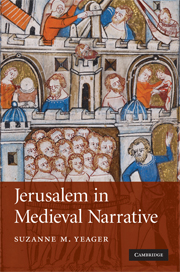Book contents
- Frontmatter
- Contents
- Acknowledgments
- List of abbreviations
- Introduction: texts and contexts
- 1 Pilgrimage to Jerusalem: three accounts by English authors
- 2 Craving heritage: portrayals of Richard I and the English quest for Jerusalem in Richard, Coer de Lyon
- 3 The crusade of the soul in The Siege of Jerusalem
- 4 The Book of Sir John Mandeville: text of pilgrimage and spiritual reform
- 5 Beyond the Celestial and Terrestrial Jerusalem: the Promised Land in western Christendom
- Conclusion
- Notes
- Bibliography
- Index
- CAMBRIDGE STUDIES IN MEDIEVAL LITERATURE
1 - Pilgrimage to Jerusalem: three accounts by English authors
Published online by Cambridge University Press: 22 September 2009
- Frontmatter
- Contents
- Acknowledgments
- List of abbreviations
- Introduction: texts and contexts
- 1 Pilgrimage to Jerusalem: three accounts by English authors
- 2 Craving heritage: portrayals of Richard I and the English quest for Jerusalem in Richard, Coer de Lyon
- 3 The crusade of the soul in The Siege of Jerusalem
- 4 The Book of Sir John Mandeville: text of pilgrimage and spiritual reform
- 5 Beyond the Celestial and Terrestrial Jerusalem: the Promised Land in western Christendom
- Conclusion
- Notes
- Bibliography
- Index
- CAMBRIDGE STUDIES IN MEDIEVAL LITERATURE
Summary
When one thinks of those medieval English pilgrims whose works have been edited for scholarly study, Margery Kempe is perhaps the first name that comes to mind. Indeed, with her copious weeping on her pilgrimage journeys, and wailing at Christ's crucifixion site, she stands out, as she herself admits, from other pilgrims to Jerusalem. This chapter, however, does not deal with the devotional account of Margery Kempe. While Kempe produced a narrative of her travels as mediated through “the eyes of her soul,” the works studied in this chapter offer a different focus, emanating from three different English pilgrims who are roughly contemporary with Kempe, but who present a view of pilgrimage shaped by their concern for the practicalities of physical travel. Although only a few hundred Jerusalem pilgrim accounts from Europe and England survive, Henry Savage has shown that “many thousands” of pilgrims visited Jerusalem annually. According to G. Owst, tales of pilgrim experience were usually spread orally, often in sermons; thus the relatively small number of extant texts does not represent the full extent to which pilgrimage pervaded English medieval society. Those that do survive, however, offer an outline of what the experience of English pilgrimage involved.
While this chapter seeks to describe the practicalities of the pilgrim journey, it also explores the significance of Jerusalem to the English traveler, itinerary reader, and writer.
- Type
- Chapter
- Information
- Jerusalem in Medieval Narrative , pp. 17 - 47Publisher: Cambridge University PressPrint publication year: 2008



